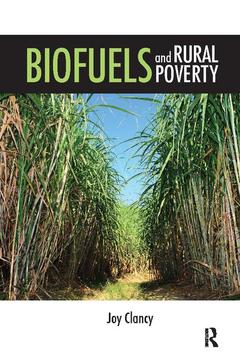Description
Biofuels and Rural Poverty
Routledge Studies in Bioenergy Series
Author: Clancy Joy
Language: English
Keywords
production; sweet; sorghum; crops; programme; palm; oil; small; scale; farmers; Tamil Nadu; Biofuel Production; Ethanol Fermentation; Sweet Sorghum; Biofuel Crops; Women’s Time Poverty; Rural Poor; Biofuels Programmes; Energy Poverty; Energy Carriers; Small Scale Farmers; Growing Biofuel Crops; Biofuel Feedstocks; Ecosystem Services; Biofuel Supply Chain; Valle Del Cauca; De Fraiture; Biofuel Production Chains; Biofuel Projects; Modern Energy Carriers; Energy Balance; Energy Source; Nitrated Polycyclic Aromatic Hydrocarbons; Real Currency Exchange Rate; Companhia Nacional De Abastecimento
Publication date: 05-2017
· 15.6x23.4 cm · Paperback
Publication date: 12-2012
192 p. · 15.6x23.4 cm · Hardback
Description
/li>Contents
/li>Biography
/li>
Biofuels and Rural Poverty makes an original contribution to the current controversial global debate on biofuels, in particular the consequences that large-scale production of transport fuel substitutes can have on rural areas, principally in developing countries but also in some poor rural areas of developed countries.
Three key concerns are examined from a North-South perspective: ecological issues (related to land use and biodiversity), pro-poor policies (related to food and land security, gender and income generation) and equity of benefits within the global value chain. Can biofuels be pro-poor? Can smallholder farmers be equitably integrated in the biofuels global supply chain? Is the biofuels production chain detrimental to biodiversity?
Most other books available on biofuels take a technical approach and are aimed at addressing energy security or climate change issues. This title focuses on the socio-economic impacts on rural people's livelihoods, offering a unique perspective on the potential role of biofuels in reducing rural poverty.
1. Introduction 2. Energy and Rural Poverty 3. The Impacts of Large-scale Biofuel Production in Rural Communities 4. How Does Large-Scale Liquid Biofuel Production Affect Socio-Ecological Systems and Ecosystem Services? 5. Liquid Biofuel Production and Rural Communities’ Food Security 6. Do Liquid Biofuels address Rural Energy and Poverty Issues? 7. Can Biofuels be Made Pro-Poor?
Joy Clancy is Associate Professor in Technology and Development at the University of Twente, the Netherlands. She has published extensively on development, energy and poverty.




